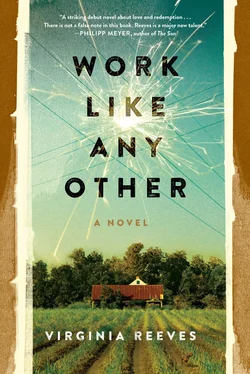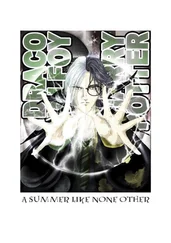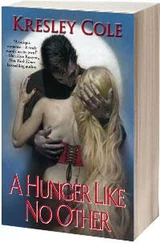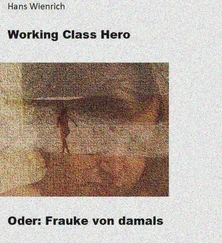“There are more.”
“No. Not just this. It’s more than the cookie lesson.” He’d brought his hands to her face. “Thank you for being here with me. Thank you for living this life.”
It wasn’t the first time he’d said those words, offered the same general gratitude — it wouldn’t be the last either — but Marie conflated every moment into this one. At times he had gotten specific, and so Marie knew the weight his words held, the reach of their meaning. He was grateful for his own profession, his escape from his father’s mines, his chance to pursue electricity, grateful for their house and their conversations and their lovemaking. Roscoe attributed every positive aspect of his life to their marriage, even the ones that had come before. He attributed too much.
But that was before Gerald was born. Afterward, their marriage accounted for little, if any, of his pleasure.
Marie left Moa and Jenny to the slicing so that she could start on the syrup. She preferred to cold-pack her peaches, putting the fruit raw into the sterilized jars, rather than submerging the fruit in the boiling syrup first. The syrup went in once the jars were full, then the lids came, then the rings. The women all took turns during the boiling, spelling each other in exchange for moments outside in the sun, the summer heat cooler than the kitchen steam, drier, even though water held tight to the air, a great humid blanket wrapped round them all season. Marie took deep breaths during her turns on the back stoop, great lungfuls of the scent-tinged air — grass and cornstalks and peanut plants, mulch and dung and mule hide. She’d grown to prefer these smells to the chalk-and-paper scent of a classroom, the tidy cleanliness.
Moa pushed out through the back screen door. She dabbed at her neck with the hem of her apron, light touches up to her jaw and then to her lips and cheeks and forehead: “Hot.”
Marie smiled.
“I’m worried about you, Miss Marie.”
Marie looked up at her. Moa was taller by a good six inches.
“Why?”
“You’re quiet even for you, and what with this electricity coming back — I don’t know. I worry it’s too much. Might spark too great a memory in you. Too much of Mr. Roscoe.” Moa squinted when she said Roscoe’s name.
Marie reached for Moa’s hand. “Don’t you worry about me, Miss Moa. Your boys will know what to do with that power when it comes.”
Moa squeezed. “All right. But you just tell me if there’s something you need.”
Marie nodded. She knew her times of going to Moa with worries were done, as gone as Wilson in his mine somewhere, lost like his paperwork. She could ask nothing of this woman who’d raised her, Moa’s mother role yet one more thing Roscoe had taken.
My shoulder has mended the best it can. There was nerve damage, the doctor explained, along with a break in the clavicle. When the doctor finally unbandaged my arm, we discovered that it wouldn’t move much. I can operate my hand, now, in clumsy motions, and I’ve convinced my arm to hang along the side of my body, but the elbow is always bent, and the whole limb no longer moves from the shoulder. The only life in it resides below the elbow, and that life is limited.
In the mornings, I eat quietly in the mess, surrounded by men. They force their way into my silence, still talking about the incident.
“Shit, Martin, I saw Beau take that club to you.”
“And then a stint in the doghouse! Goddamn.”
“I didn’t think the warden let that kind of thing happen to his pets.”
“What’s it like in the infirmary? Got yourself a pretty nurse, didn’t you?”
Dean is nearby, a regular in the library now that he’s reading on his own, exchanging books every week, and he edges his voice louder than the others. “Let him be. Man’s had enough for now.”
Rash says Dean doesn’t come when I’m away, and I don’t know what to make of his loyalty. I help him locate books that fit his interests, but he doesn’t owe me this allegiance in the mess.
“You become a pet without us knowing?” someone asks him, but Dean doesn’t take it up, and the rest of the table lets it alone. I know better than to acknowledge his help here, but I’ll thank him when I see him on Friday.
I drop my tray at the dish line and request the bucket they keep for the dogs. “You back out there, Martin?” the man at the sink says, reaching below the basin to pull out a pail.
I nod.
This pail is more specific now — only meat goes in, raw or cooked — with other buckets for the chickens and the pigs. Ever since I read Taylor a passage about the dangers of rancid meat, the kitchen has been filling the dog pail with fresh scraps.
I make my way to the east gate. The yard is less crowded, the previously leased men trickling away to their new prisons and camps. There is nothing to keep me hoping for Wilson’s life anymore — no papers, no sightings, no presence. I can only hope that his was a quick death in his mine, and that someone took note of his name so that Moa and the kids would stop their hoping, too.
Yet another new guard is on the gate, and he lets me through with few words. The guard on the other side has been here as long as I have, and he is cordial enough.
Taylor is staring off in the direction of a couple grackles, pathetic birds with their haunting insect noise. I wave to him and go directly to the barn to start on the dogs’ feeding. My shoulder doesn’t exempt me from the routine of this place.
The smell of the dog room hits me strong and foul as soon as I cross inside. Taylor’s other boys don’t tend it quite the way I do, letting the meat linger until it’s fetid.
I make my rounds to the pens, then set to filling the water buckets. Other than Taylor, I’m the only one out here, and I prefer it that way. Jackson and Jones have been gone for years. Stevens came on six months before me, and working with him is a punishment, everything that comes out of his mouth either an insult or an idiocy. He loves to be the one hitched to the dogs while I’m the one running, pride flushing him as if it were a real run, and he were a real deputy warden.
Taylor’s other men aren’t much better. I imagine he agrees.
Taylor is at the fence when I finish. “I’ve made a decision, Martin. I’m retiring Maggie to the whelping trade.”
“Sir?”
“You’ve seen how bad some of them pups from other places turn out. Figure we can at least do better than that.” He’s still blaming the ruined off-lead experiment on the dog rather than his own misuse of information. “Plus, the dog’s not so quick as she once was. Falling behind. One of the best I’ve ever had, so I figure we might well get some good stock out of her.”
Maggie is just on the other side of the fence, and I reach over to tug her ears. She’s my favorite of the dogs, and motherhood doesn’t seem a fitting retirement. Her eyes are reticent, as though she already knows.
TAYLORhires out the stud from another friend of his in the industry — not Atmore — and I’m forced to listen to Maggie’s cries while the male’s in residence. She is locked in the smallest pen with him, and she does everything she can to climb the wire walls.
Soon enough, he is gone, though, and Maggie rounds larger by the day. This is Taylor’s first litter, and he’s jittery as any new pa. “Read, Martin,” he shouts. “You best swallow down every word you can on the subject of breeding.”
I put requests in to Rash. “Dog breeding? You think I’m stocking that subject in here?”
“You know it’s for Taylor.”
Rash still likes to chide me, though, and the first periodical to arrive is an old copy of the Dog Fancier out of Battle Creek, Michigan. Rash chuckles as he hands it over.
Читать дальше












